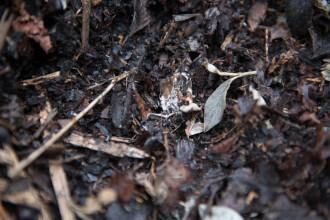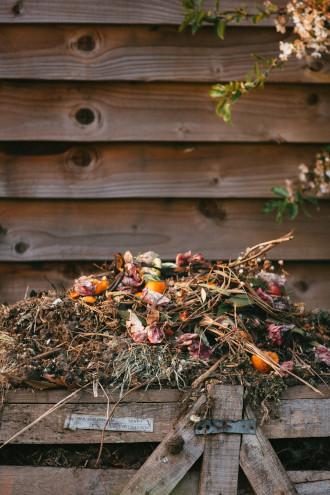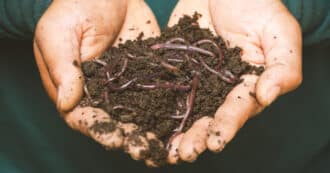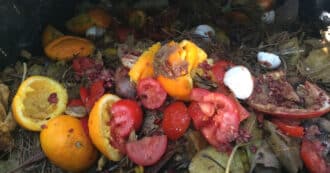By Sydney Cohen – Bokashi composting is a form of fermentation that helps create healthy, nutrient-rich food. You may be thinking “what is bokashi?” We’re here to answer your question! The Bokashi process originated in Japan and has been used for centuries as a natural way to decompose organic material like fruits and vegetables. This process also creates an end product called “biochar.” Biochar can improve the fertility of soils, reduce the need for synthetic fertilizers, and even cut down greenhouse gas emissions from farming operations!
Composting
Organic matter, organic materials, and natural matter refer to the carbon-based compounds that are found in our natural environments. This matter most frequently is formed from the decomposed remains from animals, plants and organisms, and their waste products and can be used for composting. According to Wikipedia, “Basic structures are created from cellulose, tannin, cutin, and lignin, along with other various proteins, lipids, and carbohydrates. Organic matter is very important in the movement of nutrients in the environment and plays a role in water retention on the surface of the planet.”
Composting Food Waste
Food waste results from unused food, and the largest and most shocking amount of food waste actually comes from commercial sources. Large amounts of produce rejected from grocery stores frequently pile up in landfills and start to decompose. Not only is this simply an issue of wasted food, but it is also a waste of resources such as water, land and soil that were used to grow the food, as well as the the incredibly detrimental environmental effects on the planet of pollution resulting from the transport of the food both nationally and internationally.
Even if we work to eliminate or minimize food waste, it is still natural for there to be food scraps that we cannot eat, such as bones from meat, fruit peels, and eggshells. Kitchen scraps and kitchen waste, however, can be utilized in more sustainable and environmentally friendly ways. Composting is a great method of creating a more circular life-cycle for our food scraps. It is quite easy to incorporate a compost bin or even a plastic bag dedicated to saving kitchen scraps into our kitchens and lifestyles. The composting process and the mixture that results has an immense benefit on our gardens and homes, and the environment.
Traditional Composting
Traditional composting, also known as backyard composting, is a process that involves layering green and brown materials, that decompose to create an organic material that acts as nutrient-rich food for our gardens. A compost heap or pile can be formed when the bucket is full, and the process is even more sufficient and can take as little as two weeks to generate nutrient and nitrogen-rich compost if it is kept in an air-tight bucket. As previously mentioned, when added to garden soil, traditional compost is a method that provides effective microorganisms and microbes to the soil, that highly benefit plants.
Vermicomposting
While traditional composting is the most well-known method, vermicomposting, or worm composting, is also highly efficient. This composting process involves specific worm species that break down food waste. “Despite their differences, traditional composting and vermicomposting use the same basic process: organic matter is consumed then excreted by decomposer organisms in the presence of air, breaking materials down into their constituents.”
Bokashi Composting
Bokashi composting, however, “is not a composting or decomposition process, but a way to treat organic matter prior to composting.”
What is Bokashi?
Bokashi is a Japanese word that means “fermented organic matter.” The host material can be almost any fine organic grain or grass-like substance which is immersed in microbes and allowed to ferment for days. The bacteria belong to three strains: yeasts, saccharomyces, lactic acid, lactobacillus and rhodopseudomonas. According to a Solana Center article on the different composting methods, “the basic idea [of bokashi composting] is that fresh food waste is placed in an anaerobic environment and inoculated with a special mix of microbes, including lactobacillus, that facilitate fermentation.”
Then, “as the microbes multiply, they create a highly-acidic environment that allows the organic material to retain most of its structure and nitrogen for an extended period of time. Of course, this won’t create finished compost on its own– in fact, while kept anaerobic, bokashi prevents decomposition from occurring. The real magic happens when air is re-introduced to the system.” The Bokashi fermentation process only takes about two weeks after the bucket has been sealed, and the fermentation process can be accelerated with the addition of bokashi bran, which infuses microbes into the fermented material.
How Does Bokashi Compost Work?
Bokashi is an anaerobic process that involves layering kitchen waste and scraps with a special inoculant. The result is a highly nutritious plant nutrient that can be buried in compost trenches in a garden. The liquid byproduct makes excellent fertilizer bokashi tea for feeding plants directly. The bokashi method requires an airtight bokashi bucket or bokashi bin with the ability to drain off the liquid that is produced. That way, the liquid can be drained off to prevent smells of foulness in the bucket without wasting oxygen.
“Once food waste has been fully fermented, it can be added to an aerobic composting system to fully degrade.” One can add the bokashi compost to be used with both traditional and vermicomposting methods, once the fermented bokashi has finished. “Bokashi-treated waste can be combined with “browns” for traditional composting, or added to a worm bin in the same manner as regular food waste. Additionally, using bokashi provides an additional and very low-maintenance composting; the fermented waste can be “trenched” (buried and covered with 12–18 inches of the excavated soil) where it can decompose and enrich the soil”, where the oxygen in the soil also aids the decomposition process.
Where Did Bokashi Come From?
Most Bokashi sites state that the inoculant (usually called EM or Effective Micro-organism) was discovered or developed by Dr. Teuro Higa. In Asian countries, including Korea, deliberate collection and culturing of naturally occurring soil microorganisms has been common agricultural practice for centuries. While there’s a huge body of independent scientific work establishing the many virtues of both regular compost and of vermicompost, no such body of work yet exists for Bokashi. Bokashi is the new kid on the home composting block.
Bokashi Represents The Buddhist “Mottanai” Concept
Bokashi’s discovery in Japan is not surprising given the deep importance of sustainability in Japanese culture. In Japanese culture, there is a Buddhist concept called “Mottanai” that is meant to communicate the value of each item and the anguish over wasting that item’s potential.
As Lily Crossley-Baxter describes in her article, Japan’s ancient way to save the planet, Mottanai is visible today in the metals used for making the medals, made from recycled materials, at this year’s Olympic Games in Tokyo, as well as in Shikoku, Japan’s fourth-largest island, where they are striving to make their whole community waste-free. The use of the word Mottanai to galvanize modern efforts towards sustainability in Japan and around the world is an exciting development that can inspire all those looking to increase sustainability through their unique religious and cultural heritage.
Why Choose Bokashi Composting?
Bokashi compost is richer in effective microorganisms than any other form of compost. Plants thrive when the soil is full of beneficial microorganisms. Food waste has a higher value for building health for bio-diverse soils than general yard trimmings. These microbes multiply on the organic materials we supply for them and end up in our garden soil.
The Benefits of Bokashi
Both bokashi composting and traditional composting provide your garden and plants with the same benefits. The tea has no real value and the fermented food scraps still need to be disposed of.
Urban Composting
Using these methods Bokashi makes sense for apartment owners and others with no garden. The bokashi process is incredibly sustainable as all of the fermented materials involved in the process benefit your soil and plants’ roots. Bokashi tea, for example, is a liquid resulting from the fermenting process that also enriches whatever soil it is poured onto. Additionally, the bokashi bran can be added directly into the soil as an organic fertilizer, though this method does not contain as many nutrients as the full 2-week process generates.
Turn Your Waste Into A Resource
As the world population continues to grow and we continue to produce more food, there is an increased need for buying less and finding sustainable methods of managing the waste we produce. Bokashi composting offers a great solution that can help you do your part in creating something new from what would otherwise be considered trash.
* Featured image source





